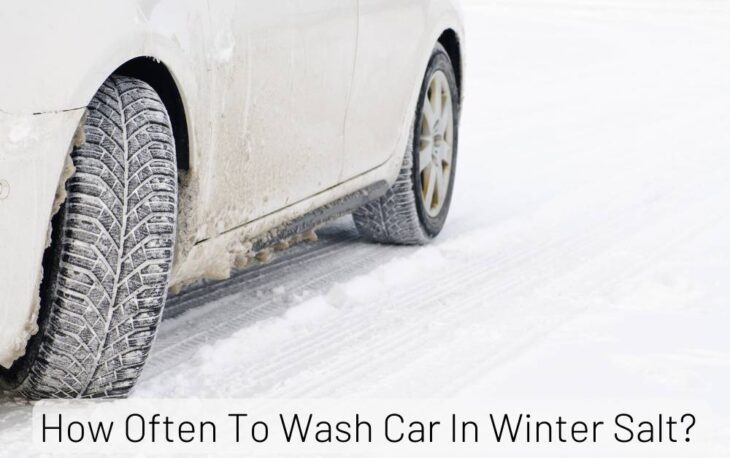Every 10 to 14 days.
During winter, road salt becomes a necessary evil to keep our roads safe and ice-free. However, the same salt can wreak havoc on our vehicles, causing corrosion and damaging paint. So, how often to wash car in winter salt?
In this blog post, we’ll delve into the importance of car washing during the winter months, taking into consideration the effects of salt on your vehicle’s paint and undercarriage, and provide practical tips on how to maintain your car’s cleanliness and integrity in the face of those pesky winter road salts.
Keep Reading!!
How Often To Wash Car In Winter Salt?
As a general guideline, it’s a good idea to wash your car every 10 to 14 days during winter or more frequently if you live in an area with heavy salt usage. This helps remove the accumulated salt and grime, protecting your car’s paint and undercarriage from the corrosive effects of salt.
Be sure to pay special attention to the wheel wells, undercarriage, and door jambs, where salt can hide and cause damage over time.
It’s crucial to wash your car during warmer temperatures when the snow and ice have melted, as this can cause a rapid buildup of salt and grime.
Don’t forget to thoroughly dry your vehicle after washing to prevent any remaining moisture from freezing and causing further damage.

How Does Road Salt Damage A Vehicle?
The corrosive nature of road salt affects various car components, making it crucial for drivers to be aware of the potential harm and take necessary precautions.
Here’s how road salt can damage a vehicle:
1) Corrosion
The primary concern with road salt is its ability to cause corrosion. When salt dissolves in water, it forms an electrolyte solution that can speed up the oxidation process, leading to rust on metal parts. The undercarriage, brake lines, exhaust system, and suspension components are particularly susceptible to this damage.
2) Paint Damage
Road salt can also harm your car’s paint job. As the salt accumulates on the vehicle’s surface, it can create small scratches or chips in the paint. These areas can become rustic if left untreated, compromising the car’s aesthetic appeal and resale value.
3) Electrical Components Damage
Salt and moisture can penetrate electrical connectors, causing corrosion and potential electrical malfunctions. This can lead to issues with various systems, such as lighting, sensors, and even engine performance.
4) Metal Fatigue
Prolonged exposure to road salt can weaken metal components over time, causing them to become more susceptible to fatigue and failure. This is especially concerning for critical parts like suspension and chassis, as it can impact the vehicle’s safety and performance.
5) Rubber And Plastic Components Damage
While not as susceptible as metal parts, road salt can also affect rubber and plastic components. Salt and grime can cause rubber seals and bushings to become brittle and crack, leading to potential leaks and reduced performance in suspension and steering systems.
Similarly, plastic parts like bumpers, trim, and underbody shields can become weakened and susceptible to damage.
6) Windshield And Windows Scratches
Salt and grit on the road can cause tiny scratches on your windshield and windows, impairing visibility and potentially compromising the structural integrity of the glass.
Moreover, salt residue can leave a hazy film on the glass, reducing visibility and making it difficult to see in low-light conditions.
7) Wheels Damage
Road salt can contribute to the corrosion of wheel rims and accelerate wear on tires. The salt can cause pitting on alloy wheels and eat away at the protective coating, while brine can seep into tiny cracks in tires, making them more prone to punctures and reducing their lifespan.

You May Also Like To Read:
Useful Tips For Washing Car In The Winter Salt.
Washing your car in winter salt requires special care and attention to protect your vehicle from harsh elements. Here are some useful tips to help you effectively wash your car during the winter months:
- Choose a day when the temperature is above freezing (32°F or 0°C) to prevent water and cleaning solutions from freezing on your vehicle’s surface or crevices.
- Select a pH-neutral, non-abrasive car wash soap to wash road salt specifically designed for use during winter. This will help remove road salt, grime, and dirt without damaging your car’s paintwork.
- Before applying any soap, rinse your car thoroughly with water to remove any loose dirt, grime, and salt. This will help prevent scratches and swirl marks during the washing process and will keep your car clean.
- A microfiber wash mitt or soft sponge is ideal for cleaning your car’s surface without causing scratches. Work in small sections, starting from the top and moving downward, to ensure you don’t spread dirt and salt back onto already-cleaned areas.
- Road corrosive salt tends to accumulate on your car’s undercarriage, making it crucial to clean this area thoroughly. Use a hose or a specialized undercarriage wash attachment to spray away salt and grime.
- Salt and grime can cause damage to your wheels and tires. Use a dedicated wheel cleaner and a soft-bristle brush or wheel cleaning mitt to clean the wheels, paying special attention to the rims and lug nuts.
- Also, scrub the tires with a stiff brush to remove salt and dirt buildup.
- After washing your car, thoroughly rinse with clean water to remove any remaining soap, salt accumulation, grime and other harsh chemicals.
- Be sure to use a low-pressure setting on your hose to prevent damage to the paintwork. To avoid water spots and freezing, dry your vehicle using a microfiber drying towel or chamois, working from the top down and focusing on areas like door jambs, mirrors, and seals.
- Once clean and dry, consider applying a coat of wax or paint sealant to protect the paintwork from future salt exposure and make it easier to clean the next time. This extra layer of protection can help guard against scratches, corrosion, and fading.
- Road salt can also find its way into your car’s interior. Vacuum the floor mats and carpeting to remove salt and debris, and wipe down surfaces with a damp cloth or interior cleaner.
Why Is Car Washing Essential In Winter?
Car washing is essential during winter for several reasons, all of which contribute to maintaining your vehicle’s longevity, performance, and appearance. With the harsh weather conditions and increased use of road salt, winter can take a toll on your car.
Here are some of the primary reasons why car washing is crucial during the colder months:
1) Protection From Salt Damage
Road salt helps keep roads safe by melting snow and ice, but it can also cause significant damage to your vehicle by promoting rust and corrosion. Washing your vehicle regularly in winter helps remove accumulated salt and grime, protecting the exterior and metal components from the corrosive effects of salt.
2) Improved Visibility
When temperature drops Snow, ice, slush, and dirt can accumulate on your windshield, windows, headlights, and taillights, reducing visibility and making it difficult to see on the road.
Washing your vehicle during winter ensures that your lights and windows remain clean, enhancing driving safety. You can use handheld pressure wand.
3) Prevents Paint Damage
Dirt, grime, and grit can scratch your car’s paint job, leading to potential rust spots and a diminished appearance. Regularly washing your car in winter helps protect the paintwork and preserves your vehicle’s resale value.
4) Maintains Rubber And Plastic Components
Road salt and grime can cause rubber seals and bushings to become brittle, leading to potential leaks and reduced performance. Washing your vehicle regularly in winter helps protect these components from damage.
5) Enhanced Performance
Accumulated dirt, ice, and slush can add extra weight to your vehicle, negatively impacting fuel efficiency, handling, and performance.
Regular car washes during winter help remove this excess buildup, ensuring your car performs optimally despite the harsh conditions.
6) Prevents Frozen Locks And Doors
When dirt, ice, and grime accumulate around your car’s door locks, handles, and seals, it can lead to frozen locks and doors that are difficult to open. Washing your car regularly helps keep these areas clean and prevents freezing issues.
7) Extends The Life Of Wiper Blades
Dirt, salt, and ice particles on the windshield can cause wiper blades to wear down quickly. Regularly washing your car in winter helps keep the windshield clean, reducing the strain on wiper blades and extending their lifespan.
8) Undercarriage Care
Your vehicle’s undercarriage is often overlooked, but it’s one of the area’s most susceptible to rust and corrosion due to road salt exposure. Washing your car in winter with a focus on the undercarriage helps protect crucial components like the exhaust system, suspension, and brake lines.

FAQ
What is an ideal temperature to wash your vehicle?
Selecting the ideal temperature to wash your vehicle in cold weather is crucial, as it can impact the effectiveness of the cleaning process and prevent potential damage to your car’s components. Generally, it’s best to wash your car when the outdoor temperature is above freezing (32°F or 0°C) to ensure that water and cleaning solutions don’t freeze on your vehicle’s surface or in its nooks and nooks and crannies.
Avoid washing your vehicle in extreme temperature.
How long does it take salt to rust your car?
The time it takes for salt to cause rust on your car can vary depending on factors such as climate, exposure, and the vehicle’s protective coatings. Rusting process can start its chemical reaction and forming in as little as a few weeks to a couple of months if the car is exposed to salt and moisture regularly without proper cleaning and maintenance.
Is salt water bad for car?
Yes, saltwater is bad for your car. Saltwater can accelerate the corrosion process on metal components, damage paintwork, and cause issues with electrical systems. It is essential to rinse your car thoroughly with fresh water after exposure to saltwater and maintain regular washing and waxing to protect against corrosion and other damages.
Conclusion:
Washing your car every 10 to 14 days in the winter can help protect it from the harsh effects of road salt. Stay vigilant, watch the weather, and adjust your car washing frequency accordingly to keep your vehicle clean, looking great and running all winter smoothly.
Affiliate Disclosure: Cars Escort is a participant in the Amazon Services LLC Associates Program. As an Amazon Associate, we earn from qualifying purchases made through affiliate links on our site. Read Our Disclaimer .

